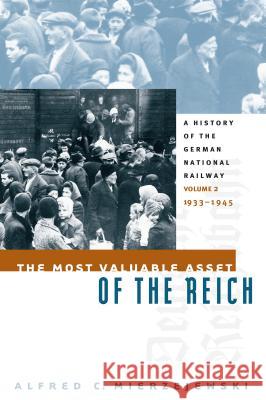The Most Valuable Asset of the Reich: A History of the German National Railway Volume 2, 1933-1945 » książka
The Most Valuable Asset of the Reich: A History of the German National Railway Volume 2, 1933-1945
ISBN-13: 9781469613963 / Angielski / Miękka / 2014 / 274 str.
The largest enterprise in the capitalist world between 1920 and 1945, the Deutsche Reichsbahn (German National Railway) was at the center of events in a period of great turmoil in Germany. In this, the second volume of his comprehensive history of the Reichsbahn, Alfred Mierzejewski offers the first complete account of the national railway under Hitler's regime.
Mierzejewski uses sources that include Nazi Party membership records and Reichsbahn internal memoranda to explore the railway's operations, finances, and political and social roles from 1933 to 1945. He examines the Reichsbahn's role in German rearmament, its own lack of preparations for war, and its participation in Germany's military operations. He shows that despite successfully resisting Nazi efforts to politicize its internal functions, the Reichsbahn cooperated with the government's anti-Semitic policies. Indeed, the railway played a crucial role in the Holocaust by supporting the construction and operation of the Nazi death camps and by transporting Jews and other victims to them.
The largest enterprise in the capitalist world between 1920 and 1945, the Deutsche Reichsbahn (German National Railway) was at the center of events in a period of great turmoil in Germany. In this, the second volume of his comprehensive history of the Reichsbahn, Alfred Mierzejewski offers the first complete account of the national railway under Hitlers regime.
Mierzejewski uses sources that include Nazi Party membership records and Reichsbahn internal memoranda to explore the railways operations, finances, and political and social roles from 1933 to 1945. He examines the Reichsbahns role in German rearmament, its own lack of preparations for war, and its participation in Germanys military operations. He shows that despite successfully resisting Nazi efforts to politicize its internal functions, the Reichsbahn cooperated with the governments anti-Semitic policies. Indeed, the railway played a crucial role in the Holocaust by supporting the construction and operation of the Nazi death camps and by transporting Jews and other victims to them.











